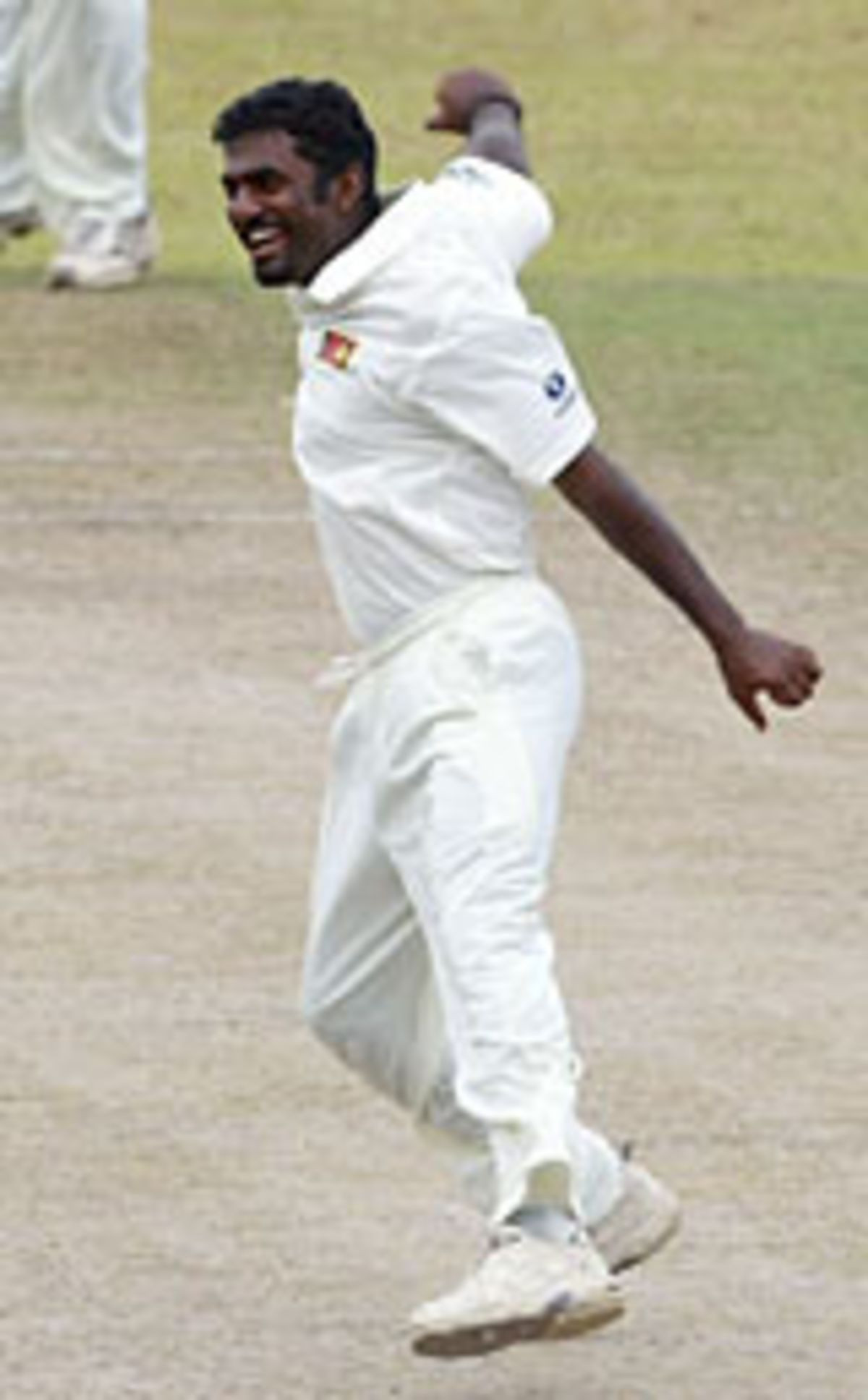England have started their home Test season with a three-match series against Sri Lanka. Ollie Pope is leading the hosts in the first Test at Old Trafford, with all-rounder Ben Stokes out with a hamstring injury that he sustained playing The Hundred last week. Sri Lanka captain Dhananjaya de Silva won the toss and the visitors have got off to a shaky start batting first, losing three wickets in just the first seven overs.
Prior to the start of play, both sides lined up on the outfield for a tribute to the late Graham Thorpe, who died on August 4, aged 55. England are also wearing black armbands in honour of Thorpe, who had played 100 Tests and 82 ODIs for England between 1993 and 2005 and was the side's batting coach between 2019 and 2022.
Thorpe's last role in the sport was a short stint as head coach of Afghanistan. He was appointed into the role in March 2022 but he could never start out on it as he was hospitalised shortly thereafter. The Afghanistan board announced four months later that it was looking for a new coach.
Thorpe was a well-respected figure in the English cricketing circuit. He scored 6,744 runs in Test cricket, which included 16 centuries, at an average of 44.66. The stylish left-handed batter also smashed 2380 runs laced with 21 fifties at an average of 37.18.
The 55-year-old had died on the morning of August 4 after being hit by a train. His wife Amanda later said that he had taken his own life in a development that sent shockwaves through the cricket world. The tragic incident happened at the Esher railway station, southwest of London, Surrey Coroner's Court in Woking was told. The area coroner for Surrey, Simon Wickens, recorded Thorpe's cause of death as one of multiple injuries during the short hearing.
Thorpe had been hospitalised in May 2022 on account of being “seriously ill”. Amanda Thorpe told The Times that the former Surrey batsman attempted suicide two years ago before taking his own life.
A Cricket Legend's Legacy
Graham Thorpe was a top drawer left-handed batsman who played for England during the 1990s and the early years of the new millennium. He began his international career with an unbeaten 114 against Australia in the third Test of the Ashes series at Nottingham in 1993 and did not look back after that. In a career spanning 12 years, he played in 100 Test matches and 82 One-Day Internationals (ODIs), scoring a total of 9,124 runs, with the double century (200 not out) against New Zealand at Christchurch in 2000 as his highest score. He was the mainstay of England middle order and, at his peak, one of the best batsmen in the world, capable of handling fast bowling and spin with equal ease. He was also an excellent fielder, both close to the wicket as well as in the deep.
A Troubled Mind
After his retirement from the game in 2005, Thorpe had a short innings in the commentary box after which he took up coaching. He did coaching assignments in New South Wales and Surrey before being appointed as the batting coach of England white-ball side in 2013. He was part of the team of coaches who worked with the England squad till he was removed following the defeat in Ashes series in 2022. Though he was appointed as the coach of Afghanistan side in 2022, he did not take up the assignment citing “serious illness”. Though it was informed to the media that he was admitted to intensive care unit for treatment, the exact nature of his condition was not revealed.
The death of this popular cricketer after being struck by a train at Esher railway station on August 4 shocked the followers of the game world over. Initially, it was thought that he had met with an accident. However, his family revealed later that he was suffering from severe depression and had committed suicide. His wife and daughter stated that Thorpe was so unwell in recent times that he sincerely believed that his family would be better off without him. They also added that though Thorpe was renowned as someone who was mentally strong on the field, he suffered from mental illness.
A Call for Action
This was a brave act from his family to admit that Thorpe, one of the best and most successful cricketers of his generation, suffered from anxiety and depression of such severe gravity that he decided to take his own life. The family decided to do so only to create awareness about the nature and magnitude of this problem, which is usually kept under wraps on account of shame and fear of stigma. This brings one to the larger question as to how and why successful sportspersons, who have achieved the pinnacle of glory through a combination of physical prowess and mental strength, fall prey to an illness of the mind.
In this context, the study done by National Collegiate Athletic Association (NCAA) in the US reveals the gravity of mental health problems among young athletes. According to this study, suicide is the second most common cause of death among young athletes and the number of sportspersons taking their own lives has doubled in the last 20 years. The reason attributed for this unfortunate development is the single-minded focus among athletes for attaining perfection. The overwhelming need to achieve perfection can prove to be disheartening, especially at times when one is not able to achieve it. Further, there are factors like expectations of family and coaches, peer group pressure and even physical fatigue, all of which can affect the mental health of an athlete. A talented sportsperson knows about his potential and works hard to realise it; moreover, there also exists a constant desire to push oneself further to scale greater heights. The study states that success itself can be addictive once one gets a taste of it and with that comes a constant requirement to seek more and more of it, which can lead to anxiety and depression.
The above study had focused on the mental health issues of young and up-and-coming athletes, while the death of Thorpe points to the mind related problems faced by sportspersons after their retirement. Sportspersons are unique in that they reach the peak of their careers very early in life. Successful ones enjoy the adulation and fan following that come with the territory and most of them become financially secure as well. But not even the best can stretch their careers beyond the fourth decade of their lives. What happens to them once they leave the arena? Will a feeling of emptiness and worthlessness envelop them? What will they do to fill the time now that they cannot pursue the only discipline that they had trained for all their lives?
One can understand that the issues faced by budding and even active sportspersons are different from the difficulties faced by retired ones, though they both relate to the mind and mental health. Marcus Trescothick of England was the first cricketer to openly admit his battles with depression of “mild to moderate variety” during his playing days. Trescothick confessed that he did not want to admit it due to an “old macho way” of thinking as that would have probably given the impression that he was “weak”. On the contrary, his admission regarding his problems showed him to be a brave and strong person and led to more players opening up about the difficulties they faced in this regard. This, in turn, created an atmosphere where there was greater understanding about the problem and empathy towards the persons at the receiving end. Most of the sports bodies have since started the practice of employing psychologists who can help the sportspersons during their difficult times and help them overcome the challenges they face on account of problems of the mind.
A Call to Action
Thorpe showed nerves of steel while tackling the best bowlers in difficult conditions all around the world. He possessed the strength of mind to overcome challenges that came his way to become acknowledged as one of the best batsmen of his times. After his playing days were over, he was gainfully employed as a coach, which ensured that he stayed in the limelight while continuing to contribute towards the game that defined his life. Besides, he had a loving family that supported him. But, despite all this, he decided to end his life at the rather early age of 55. One can understand the depth of his agony when one reads his observation “I will gladly trade all my runs for one day of happiness”.
In India also we have seen successful sportspersons taking their lives after their playing days were over. The names of Suresh Kumar, the left-arm spin bowler from Kerala who played for the India Under-19 side, and V P Sathyan, former captain of the national football team, come to mind quickly. There may be many more such instances which have not been reported, either out of ignorance or due to fear of shame and stigma. Moreover, it is also the case that the more popular a person is, the more attention is given by the media. Thus, there may be numerous unknown and unreported instances of former sportspersons taking the extreme step and ending their lives due to illnesses affecting their minds.
The death of Thorpe should be an eye-opener to sportspersons and sports bodies all over the world about the gravity of mental problems affecting retired athletes. It should be acknowledged that illnesses of the mind can be more severe than diseases affecting the body and need proper attention, care and treatment. There should be no shame attached to this suffering and no time must be wasted in securing the help of a trained medical professional to tackle this condition. Sports bodies should take the lead to empanel doctors and mental health professionals who can be accessed by former athletes facing problems of this nature. Players associations must play a pro-active role in helping identify possible victims and making available medical assistance to them.
The family of Thorpe deserves a round of applause for taking the bold step of revealing the nature of the illness suffered by him that took his life. Their valiant efforts will not go in vain if this leads to greater awareness and appreciation about the problem. One hopes that there are no more instances of former and contemporary sportspersons falling victims to this malaise.
Remembering a Legend
Rest in peace, Graham Thorpe. You took on the best of bowlers all around the world during your playing days and battled the demons in your mind in the years after that. You will be remembered for your contributions as a cricketer and no one will think less of you due to the revelations made by your family towards a greater cause.
(The author is a former international cricket umpire and a retired bureaucrat)
Thorpe's Legacy Lives On
On Saturday afternoon, before the match between Farnham Cricket Club and Chipstead Cricket Club, a small, understated ceremony was held pitch-side to remember Farnham’s most famous cricketing son, Graham Thorpe. It was to Farnham that Thorpe moved from Wrecclesham Cricket Club, which is where he started out as a young boy. We all start out somewhere.
Amanda Thorpe, Graham’s wife, was present, along with her two girls, Kitty, 22, and Emma, 19. Graham Thorpe’s father, Geoff, and his brothers, Ian and Alan, were there along with wider family and friends as well as Graham’s dog, Bertie, who, Amanda says, finding it hard to suppress a smile, behaved himself for once.
Amanda, Kitty and Emma have been trying hard to smile these past few days. They have been blown away by the fondness of the reflections from former team-mates and friends and the wider cricketing community and have been determined to remember the good times they shared — and there were many — before mental illness took over two years ago and took away the man they knew and loved.
The minute’s silence at Farnham, the club to which the Thorpe family have been connected for decades, was the final commemoration of a week in which cricket supporters have paid tribute with respectful silences at Cardiff, the Oval, Thorpe’s home ground, and Lord’s. Around the country, players and former team-mates have offered their respects and the family have been thankful for that.
The family contacted me on Friday through Alec Stewart and Graham’s closest friend, Jeff Banks, both rocks of support, because they wanted to express their gratitude to the many well-wishers and because they wanted to find a way, however hard that may be, of sharing some more information after a two-year silence. They want to heighten the awareness of the illness that took him, but also want to emphasise that his life should not be defined by that. There was far, far more to him than that.
“For the past couple of years, Graham had been suffering from major depression and anxiety,” Amanda says. “This led him to make a serious attempt on his life in May 2022, which resulted in a prolonged stay in an intensive care unit.
“Despite glimpses of hope and of the old Graham, he continued to suffer from depression and anxiety, which at times got very severe. We supported him as a family and he tried many, many treatments but unfortunately none of them really seemed to work.
“Graham was renowned as someone who was very mentally strong on the field and he was in good physical health. But mental illness is a real disease and can affect anyone. Despite having a wife and two daughters whom he loved and who loved him, he did not get better.
“He was so unwell in recent times and he really did believe that we would be better off without him and we are devastated that he acted on that and took his own life,” she says.
In this dark period, there were moments of light. Amanda shows me a radiant photograph of them both from a dinner at the Oval to mark Richard Thompson’s departure as chairman of Surrey in November 2022. John Major was the guest of honour and made certain, in his speech, to mark Thorpe’s presence, and the reaction in the room was suitably overwhelming.
But the illness returned. “We are not ashamed of talking about it,” Kitty says, with remarkable composure and bravery. “There is nothing to hide and it is not a stigma. We were trying to help him get better before and trying to protect him, which is why we said nothing. This is the time now to share the news, however horrible it is. We’ve wanted to be able to talk and share and we’d now like to raise awareness, too.” There is talk of starting a foundation in his name.
“He had loved life and he loved us but he just couldn’t see a way out. It was heartbreaking to see how withdrawn he had become. He was not the same person. It was strange to see this person trapped in the body of Dad. That’s why we’ve been so happy that the many reflections have been about his life before this illness took over. I’m glad that’s how everyone does remember him, rightly so, as the complete character he was.”
Kitty adds: “When I first got to university, a friend asked me what my dad did and I said he used to play cricket, and she said, ‘OMG so does mine!’ When she went home and mentioned this to her dad, the penny dropped. We still laugh about it now! He never talked about his achievements.”
Kitty remembers, above all, the dancing. “He would get up and dance anywhere to anything. He wasn’t the best dancer, but he never cared about that.” They have been lifted in recent days by the fondness with which he has been remembered. “He was so humble,” Emma recalls. “I didn’t really realise how good he was, until reading all the tributes in the past few days. He hardly ever talked about his success or his playing days. If someone asked him what he did, he’d say he knocked a ball about a bit.” Emma remembers the hours they spent playing table football together. “He taught me all his tricks, until I could finally beat him.”
Amanda remembers that anti-authoritarian streak fondly. “That’s the Graham I know and remember and loved. Graham was a free spirit, he had his own mind and his own way of going about things. He loved a loud shirt. My favourite memory of him is in Barbados, which he loved, enjoying a rum punch and listening to his favourite reggae after a swim. He was handsome, so handsome. He was funny and he made us all laugh so much.”
© Times Media Limited 2024.
Registered in England No. 894646. Registered office: 1 London Bridge Street, SE1 9GF.

















